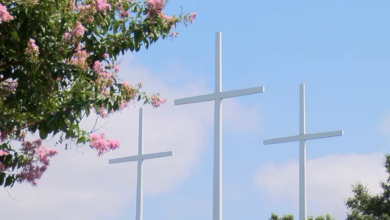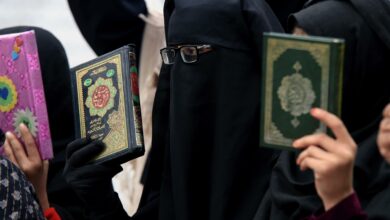Paraguayans make pilgrimage to Caacupé after years of Covid restrictions

Caacupé, Paraguay, Dec 4 (EFE).- After years of restrictions due to the Covid-19 pandemic, Paraguayans have once again made the pilgrimage to the Basilica of Our Lady of Miracles to pay tribute to the Virgin of Caacupé.
Elders, children and patients this year joined the usual ranks of visitors to this town about 58 kilometers from the Paraguayan capital, which over Wednesday and Thursday will receive the highest number of parishioners.
This year’s pilgrimage started on Nov. 28, with Dec. 8 as the main day in honor of the Virgin of Caacupé, a version of the Immaculate Conception.
At first light Sunday, hundreds of people began to move through the streets of Caacupé towards the basilica.
In cars, motorcycles, bicycles and even on horseback, the visitors arrived with a single mission: contemplating, at least a few minutes, the image of a virgin dressed in white and blue in the center of the church.
Believers came to give thanks for any favors granted or to ask for such things as good health, employment and even debt payment.
While religious chords rumbled and the Eucharist was heard, the return to normal tested the organizers.
Father Miguel Fritz, in charge of Sunday’s homily, described the organization of this mass celebration as a “challenge.”
To attend to the thousands of pilgrims, both permanent and temporary medical posts were installed. In addition, 500 police officers were allocated to provide security.
The crowds also returned to the streets of Caacupé, which in the last two years saw languishing sales due to pandemic restrictions.
The traditional Paraguayan “chipa” bun was one of the most popular items on the streets.
For Gloria Maribel, a retired teacher who had to work recent weeks in a store selling religious items because of debt, the last two years were “terrible” for this town, which is highly dependent on visitors.
The Caacupé native thanked the virgin for healing her three children, including her eldest who nearly died at birth, and for her mother’s health.
Among the pilgrims was Monica, who traveled two hours by bus from the town of Villa Elisa.
“I’m coming again after a long time,” said this 40-year-old woman, who added she has been “blessed” with her job.
Accompanying her were her two small children, whose heads were wet after visiting a water fountain outside the Tupãsy Ykua church believed to have healing powers.
A few steps from her, Ramón, a 62-year-old Argentinian who has lived in the country for more than two decades, joined those who thanked the virgin for allowing him to work.
“The miracle is that it lets us work and gives us our daily bread,” he said. EFE
rp/tw





